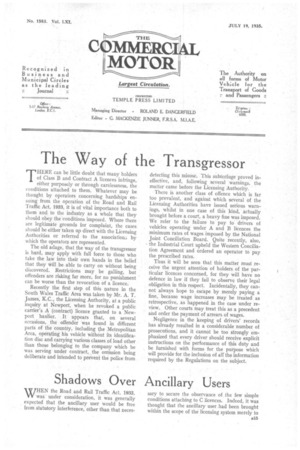The Way of the Transgressor
Page 25

If you've noticed an error in this article please click here to report it so we can fix it.
THERE can be little doubt that many holders of Class B and Contract A licences infringe, either purposely or through carelessness, the conditions attached to them. Whatever may be thought by operators concerning hardships en suing from the operation of the Road and Rail Traffic Act, 1933, it is of vital importance both to them and to the industry as a whole that they should obey the conditions imposed. Where there are legitimate grounds for complaint, the cases should be either taken up direct with the Licensing Authorities or referred to the association.; by which the operators are represented.
The old adage, that the way of the transgressor is hard, may apply with full force to those who take the law into their own hands in the belief that they *ill be able to carry on without being discovered. Restrictions may be galling, but offenders are risking far more, for no punishment can be worse than the revocation of a licence.
Recently the first step of this nature in the South Wales Traffic Area was taken by Mr. A. T.
James, K.C., the Licensing Authority, at a public inquiry at Newport, when he revoked a public carrier's A (contract) licence granted to a Newport haulier. It appears that, on several occasions, the offender was found in different parts of the country, including the Metropolitan Area, operating his vehicle without its identifica tion disc and carrying various classes of load other than those belonging to the company which he was serving under contract, the omission being deliberate and intended to prevent the police from detecting this misuse. This gubterfuge proved ineffective, and, following several warnings, the matter came before the Licensing Authority.
There is another class of offence which is far too prevalent, and against which several of the Licensing Authorities have issued serious warnings, whilst in one case of this kind, actually brought before a court, a heavy fine was imposed. We refer to the failure to pay to drivers of vehicles operating under A and B licences the minimum rates of wages imposed by the National Joint Conciliation Board. Quite recently, also, the Industrial Court upheld the Western Conciliation Agreement and ordered an operator to pay the prescribed rates.
Thus it will be seen that this matter must receive the urgent attention of holders of the par ticular licences concerned, for they will have no defence in law if they fail to observe their legal obligation in this respect. Incidentally, they can not always hope to escape by merely paying a fine, because wage increases may be treated as retrospective, as happened in the case under review. Other courts may treat this as a precedent• and order the payment of arrears of wages.
Negligence in the keeping of drivers' records has already resulted in a considerable number of prosecutions, and it cannot be too strongly em phasized that every driver should receive explicit instructions on the performance of this duty and be furnished with forms for the purpose which will provide for the inclusion of all the information required by the Regulations on the subject.




















































































